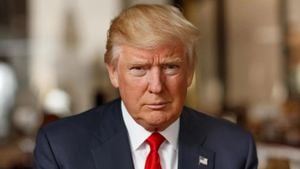With the upcoming elections, education policies are taking center stage, especially under the potential second term of Donald Trump. His plans, already causing quite the stir, focus on dismantling the current federal educational framework, particularly the U.S. Department of Education. Early discussions around his education agenda have prompted countless debates among educators, parents, and policy-makers alike.
During the previous election campaign, Trump emphasized his commitment to what he termed "saving American education." From his remarks, it is clear he sees the current educational environment as lacking, primarily accusing it of indoctrinating students with inappropriate material. Trump articulated his desire to totally refocus education to prioritize real-world readiness over what he calls politically and sexually charged curriculums.
One of his more ambitious proposals is the total abolition of the Department of Education, which he believes has strayed too far from its original intent. Historically, the Department has played a role in ensuring educational equity and funding for disadvantaged schools. Should Trump's proposal come to fruition, the ramifications for students and educators could be significant, leaving states to navigate educational funding and accessibility on their own.
Part of the reasoning behind this drastic proposal stems from Trump's frustration with federal funding streams tied to what he refers to as "radical" ideologies, such as Critical Race Theory (CRT).CRT has been under fire from various political fronts, with Trump vowing to cut off federal funding for any school or program promoting such content. This move aligns with his goal of returning school choice to parents and local communities, effectively decentralizing public education.
Critics of this approach have raised alarms about the potential shifts toward uneven funding and disparities among educational institutions, particularly affecting economically disadvantaged areas. This concern highlights the delicate balance of federal and state oversight and the way it shapes equitable access to education.
Trump has also placed significant emphasis on parental rights within the educational system. His proposed reforms would allow parents comprehensive access to their child's educational materials, decisions made by school officials, and the option to opt-out of certain health programs. The details articulated by Trump require schools to be more transparent and accountable to families.
His plans even extend to Big Changes for Title IX, which currently protects against gender-based discrimination. If enacted, Trump's proposals could reshape sports dynamics for transgender athletes, requiring them to compete based on their sex assigned at birth. This has raised considerable debate across different demographic and interest groups, with many arguing it undermines the rights of transgender youth.
When it boils down to financing education, Trump's administration seems set on making substantial adjustments. Under the banner of parental choice, he envisions systems allowing families to select schools freely, perhaps even seeing some federal resources redistributed based on the attendance choices of students. Such changes would undoubtedly alter how schools engage with communities and strategize their funding.
Despite the controversies, some see Trump's commitment to parental rights and direct control over local schools as refreshing. Advocates argue it may lead to educational systems more aligned with community values. Still, it opens the door to potential ideological divides, which could lead to broader inequities if funding is contingent on these values.
Moving forward, the key questions remain: How will these proposed changes affect the quality of education across varied regions? Will abolition of the Department of Education mean equitable access to education or intensified disparity? Most educators voice concerns over the potential loss of federal support, often which is intended to assist states struggling financially.
While Trump remains vague on his student loan policies, he has made clear his intention to walk away from forgiveness programs, placing his administration's focus elsewhere. This stance contrasts starkly with the Biden administration's efforts to ease debt for many borrowers through various programs. Trump has not articulated concrete plans for current borrowers, which raises alarm for many students and graduates still shouldered by significant debt.
Overall, this new agenda promises to shake up the fabric of American education. For many, the ramifications are unclear, but conversations around educational equity, parental rights, and the role of federal oversight are bound to dominate discussions as the election approaches. Teachers unions, educators, and lawmakers are united in their interest to assess how these policies will pan out, as the traditional educational narrative within the U.S. hangs in the balance. And as Trump's plans take shape, the future of American education remains both promising and uncertain.



